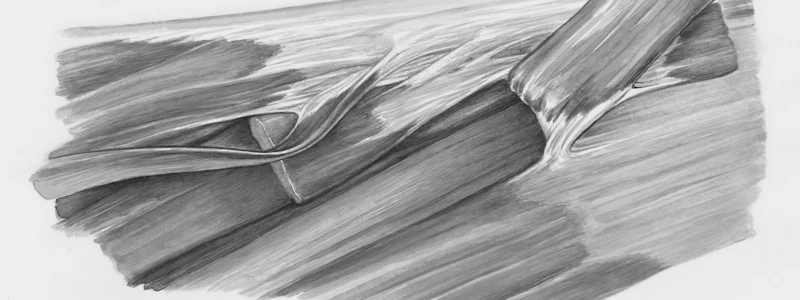Podcast
Questions and Answers
What are myofibers primarily responsible for in muscle tissue?
What are myofibers primarily responsible for in muscle tissue?
- Conducting nerve impulses
- Enabling muscle contraction while bearing weight (correct)
- Providing structural support
- Storing energy for muscle contraction
Which of the following is a common cause of muscle spasms or cramps?
Which of the following is a common cause of muscle spasms or cramps?
- Excessive protein intake
- Overexertion of muscle tissue
- Inadequate sleep
- Poor hydration status (correct)
What characterizes a muscle strain?
What characterizes a muscle strain?
- Involves tearing of muscle tissues without any scar formation
- Always presents immediate symptoms of severe pain
- Is limited to the connective tissues only
- Results from excessive stretching or overloading (correct)
Which behavior is likely to promote osteoporosis?
Which behavior is likely to promote osteoporosis?
What is a common symptom of adhesive capsulitis?
What is a common symptom of adhesive capsulitis?
Which statement about joint disruptions is true?
Which statement about joint disruptions is true?
What is the primary symptom of spondylosis when it presses on nerve roots?
What is the primary symptom of spondylosis when it presses on nerve roots?
What typically characterizes acute compartment syndrome?
What typically characterizes acute compartment syndrome?
What is a common symptom experienced during repetitive athletic activities?
What is a common symptom experienced during repetitive athletic activities?
What key factor dictates safety in the treatment of Dupuytren’s contracture?
What key factor dictates safety in the treatment of Dupuytren’s contracture?
Which condition is commonly associated with shin splints?
Which condition is commonly associated with shin splints?
What is a primary sign of hammertoe?
What is a primary sign of hammertoe?
Which condition is characterized by an involuntary contraction of foot muscles?
Which condition is characterized by an involuntary contraction of foot muscles?
What might exacerbate acute bursitis when treated incorrectly?
What might exacerbate acute bursitis when treated incorrectly?
What condition is referred to as tenosynovitis affecting fingers other than the thumb?
What condition is referred to as tenosynovitis affecting fingers other than the thumb?
Which muscles are primarily affected in a whiplash injury?
Which muscles are primarily affected in a whiplash injury?
Study Notes
Muscles
- Composed of myofibers, threadlike cells responsible for contraction.
- Capable of contraction while supporting weight.
- Myofibers are encased in layers of connective tissue for support and structure.
Muscle Disorders
- Spasms and Cramps: Sudden involuntary contractions often caused by:
- Nutritional imbalances affecting electrolyte levels.
- Ischemia, a reduction in blood flow.
- Dehydration which leads to muscle dysfunction.
- Strains: Commonly known as "pulled muscles."
- Involves tearing of myofibers, resulting in scar tissue formation.
- Typically caused by overstretching or excessive loading of muscles.
Bone Disorders
- Osteoporosis: Condition leading to weakened bones.
- Contributing factors include:
- High protein intake causing calcium loss through urine.
- Natural bone density reduction post-menopause.
- Smoking leading to decreased bone health.
- Contributing factors include:
- Postural Deviations: Malalignments of the spine.
- Hyperkyphosis: Characterized by an exaggerated thoracic curve.
- Rotoscoliosis: Involves spinal rotation alongside scoliosis.
Joint Disorders
- Adhesive Capsulitis: Known as "frozen shoulder."
- Inflammation and thickness of connective tissues surrounding the shoulder joint.
- Joint Disruptions:
- Subluxation: Involves misalignment of bones with an intact joint capsule.
- Dysplasia: Congenital defect resulting in abnormal acetabulum or femoral head.
- Joint Replacement Surgery: May result in permanent limitations in range of motion.
- Spondylosis: Typically asymptomatic, causing slow, painless stiffening of the spine if it does not press on nerve roots.
- Temporomandibular Joint Disorders (TMJ): Factors causing issues include:
- Myofascial pain syndrome with trigger points.
- Damage to cartilage disks in the jaw.
- Osteoarthritis affecting joint function.
Fascial Disorders
- Compartment Syndrome:
- Acute: Sudden massive swelling requiring urgent medical attention.
- Chronic: Related to repetitive athletic stress, characterized by:
- Symptoms such as pain, cramping, weakness, numbness, and altered gait during activity.
- Dupuytren’s Contracture: Treatment options depend on intact sensation in the hand; neuropathy is a contraindication for certain therapies.
- Ganglion Cysts: Usually found on the wrist, hand, or foot.
- Hammertoe:
- Symptoms include pain, visible foot deformity, muscle contractions, and skin changes like corns.
Neuromuscular Disorders
- Myofascial Pain Syndrome: Lacks a universally accepted definition; individuals with active trigger points may be overly sensitive and at risk of overtreatment.
Other Connective Tissue Disorders
- Bursitis:
- Acute cases can worsen with invasive massage techniques.
- Subacromial Bursitis: Improper massage can increase pain and inflammation.
- Shin Splints:
- Medial tibial stress syndrome (MTSS) commonly arises from excessive exercise; related to periostitis and stress fractures.
- Tendinopathies:
- Tendinitis: Acute inflammation marked by redness, heat, swelling, and pain.
- Tenosynovitis: Irritation of tendons as they glide through their sheath; includes "trigger finger."
- Whiplash:
- Muscles commonly affected include:
- Sternocleidomastoid and scalene muscles in the neck.
- Splenius cervicis involved in neck movement.
- Muscles commonly affected include:
Studying That Suits You
Use AI to generate personalized quizzes and flashcards to suit your learning preferences.
Description
This quiz covers the essential aspects of muscle and bone disorders, including the anatomy of muscles, common muscle disorders like spasms and strains, and significant bone disorders such as osteoporosis. Understand the causes, symptoms, and implications of these conditions for better health management.




